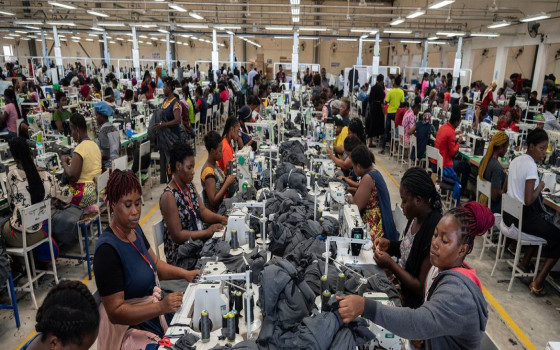UN Commission: 60% of adults in the Arab world are outside the formal financial system.. Praise for the steps taken by Jordan, Egypt, and Morocco in developing policies to access financial services

- Europe and Arabs
- Friday , 16 May 2025 8:45 AM GMT
Beirut - New York: Europe and the Arabs
The United Nations Economic and Social Commission for Western Asia (ESCWA) revealed that more than 60% of adults do not have bank accounts.
The commission's annual report, titled "Financial Inclusion in the Arab Region," reveals the persistence of financial exclusion in the region, hindering efforts to achieve sustainable development by 2030.
The report pointed to the repercussions of this on women, persons with disabilities, and rural areas. While digital finance is expanding, the digital divide remains large. ESCWA called for urgent reforms to enhance financial inclusion and achieve comprehensive development in the region.
ESCWA called for urgent reforms that include improving consumer protection, promoting financial literacy, and modernizing digital infrastructure. It emphasized that financial inclusion is essential for progress in achieving the Sustainable Development Goals.
Despite the challenges, the report noted the success of countries such as Jordan, Egypt, and Morocco in developing innovative financial policies to enhance access to financial services. According to a report issued in Beirut on the commission's website, the United Nations Economic and Social Commission for Western Asia (ESCWA) warned in a new report that approximately 60% of adults in the Arab region remain outside the formal financial system, reflecting persistent financial exclusion and undermining the region's ability to achieve the Sustainable Development Goals by 2030.
The report, entitled "Sustainable Development Goals 2025 Annual Review: Financial Inclusion in the Arab Region," paints a disturbing picture of the state of financial inclusion, highlighting the continued deprivation of millions of people from economic opportunities due to these inequalities.
"Financial services are no longer a luxury in the Arab region," said Mario Gallese, ESCWA Economic Affairs Officer and author of the report. "Without true financial inclusion, it is impossible to eradicate poverty, empower small businesses, or achieve equitable and inclusive economic growth."
Women are among the most marginalized groups, with only 29% of women having bank accounts or e-wallets, making the Arab region the lowest in the world in women's financial inclusion. The gender gap is 13 percentage points. The situation is not much different for persons with disabilities, with only 21% of those with access to financial services due to discriminatory practices, inadequate infrastructure, and the absence of inclusive policies and legislation.
The report also highlights the rural-urban divide, with rural residents twice as likely to be deprived of formal financial services as urban residents in several countries. Youth, informal economy workers, and refugees also face additional challenges that increase their exposure to economic and social risks.
Mobile finance has seen significant expansion, with the number of digital accounts doubling between 2020 and 2023. However, the report warns of a "digital divide within a divide," as a result of poor internet connectivity, limited smartphone ownership, and low levels of digital literacy, hindering the most marginalized groups from benefiting from these solutions. In conflict-affected countries, mobile services are often unavailable or subject to frequent interruptions. Access to credit remains a major challenge, with only one in five adults borrowing from formal financial institutions. Given this financing gap, micro, small, and medium-sized enterprises (MSMEs) face difficulties that limit their ability to innovate and create new job opportunities.
ESCWA called for urgent reforms, including strengthening consumer protection, promoting financial literacy, integrating gender and disability issues into financial policies, and modernizing digital infrastructure. It also emphasized the importance of developing interoperable digital identity systems to facilitate secure and universal access to services.
The report places financial inclusion within the broader context of achieving the Sustainable Development Goals (SDGs). Data shows that only 18% of global targets are on track, with stagnation or decline in several Arab countries. In this context, ESCWA emphasizes that financial inclusion is a prerequisite for progress in poverty eradication, education, gender equality, and decent work. Despite the bleak picture, the report highlights successful experiences in countries such as Jordan, Egypt, and Morocco, which have made remarkable progress in expanding digital finance and reaching marginalized groups through innovative regulatory reforms and targeted programs.
The report concludes that the path to change is possible, but it requires political will, well-informed investments, and an approach that engages all segments of society.
ESCWA is one of the five United Nations regional commissions, working to support comprehensive and sustainable economic and social development in Arab countries and promote regional integration.
ESCWA was established in 1973 to stimulate economic activity in member states, enhance cooperation among them, and promote development.
It comprises 21 countries: Egypt, Morocco, Jordan, the United Arab Emirates, Saudi Arabia, Djibouti, Lebanon, Syria, Sudan, Somalia, Iraq, Palestine, Bahrain, Tunisia, Algeria, Libya, Yemen, Mauritania, Qatar, Kuwait, and the Sultanate of Oman.,














No Comments Found